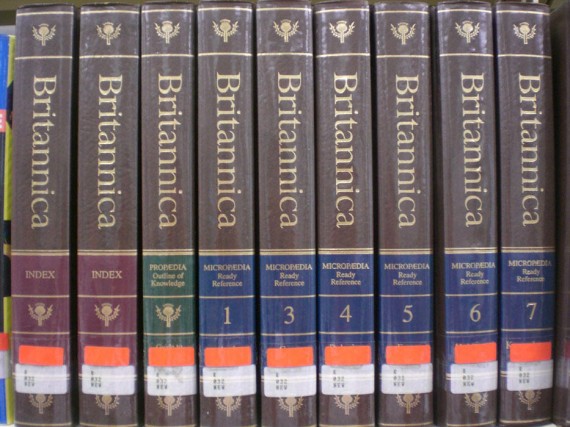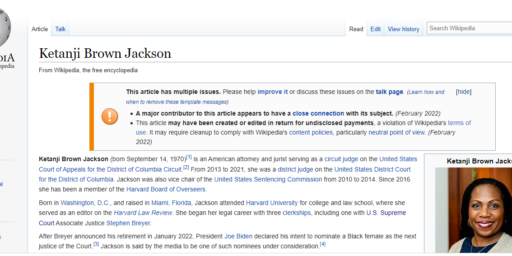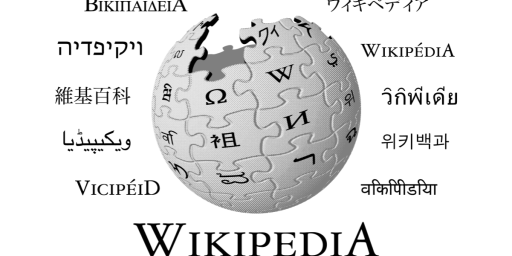The End Of Encyclopedia Britannica
After nearly two and a half centuries, the Encyclopedia Britannica is ending its days as a print publication:
After 244 years, the Encyclopaedia Britannica is going out of print.
Those coolly authoritative, gold-lettered sets of reference books that were once sold door to door by a fleet of traveling salesmen and displayed as proud fixtures in American homes will be discontinued, the company is expected to announce on Wednesday.
In a nod to the realities of the digital age — and, in particular, the competition from the hugely popular Wikipedia — Encyclopaedia Britannica will focus primarily on its online encyclopedias and educational curriculum for schools, company executives said.
The last edition of the encyclopedia will be the 2010 edition, a 32-volume set that weighs in at 129 pounds and includes new entries on global warming and the Human Genome Project.
“It’s a rite of passage in this new era,” Jorge Cauz, the president of Encyclopaedia Britannica Inc., a Chicago-based company, said in an interview. “Some people will feel sad about it and nostalgic about it. But we have a better tool now. The Web site is continuously updated, it’s much more expansive and it has multimedia.”
In the 1950s and 1960s, a set of encyclopedias on the bookshelf was akin to a station wagon in the garage or a black-and-white Zenith in the den, an object coveted not only for its usefulness but as a goalpost for an aspirational middle class. The books were often a financial stretch, with many families paying for their encyclopedias in monthly installments.
But in recent years, print reference books have been almost completely wiped out by the Internet and its vast spread of resources, particularly Wikipedia, which in 11 years has helped replace the authority of experts with the wisdom of the crowds.
Created as a free online encyclopedia that is now written and edited by tens of thousands of active contributors, Wikipedia has been gradually accepted as a largely accurate source, even by scholars and academics, and one that meets the 21st-century requirements of comprehensiveness and instantly updated material. It has nearly four million articles in English, many of them on pop-culture topics that would not pass muster in the pages of the Encyclopaedia Britannica.
The oldest continuously published encyclopedia in the English language, the Encyclopaedia Britannica has become a luxury item with a $1,395 price tag; it is typically purchased by embassies and well-educated, upscale consumers who feel an attachment to the set of bound volumes. Only 8,000 sets of the 2010 edition have been sold, and the remaining 4,000 have been stored in a warehouse until they can be purchased.
I grew up in an era when printed encyclopedia’s were still a big deal, and can still remember the full editions of Britannica and The World Book Encyclopedia that made their way into the middle school library of a modest suburban community in New Jersey. Or when my parents somehow managed to spring for a full World Book set. In the days before the Internet, it was the closest you could get to having the world at your fingertips and there was more than one school report that I never would have completed without them. Then, the World Wide Web came along an the idea of having a 26 volume (minus annual updates) library of knowledge began to seem kind of silly.






I was remarking in a conversation the other day that even having lived through it, it’s hard to believe there was a time where if you were talking with someone and there was neither of you knew, you had to simply live with the mystery (“who was that guy in that movie? Oh crap, his name is right on the tip of my tongue….”). Today, the idea of not being able to instantly find out would drive me up the wall.
I wonder if part of the reason politics is getting so polarized is that a decade or two ago, most political arguments would pretty quickly run into, “well, I guess we just don’t know” and conversation would have to move on to some other subject. Now each side can almost instantly find the minute details of nearly any issue and thus the arguments never end.
But, there comes a time when only having several open books on the table, floor, the other chairs, three pads of scribble and some where adrift, coffee cup, ash tray and half a sandwich feels right.
My dad bought a set in 1974 and I got a set of Compton’s kid’s encyclopedia’s as a throw-in. I still have those. I bought my own set in 1989 or 1990 and got a couple other series, including Great Books, thrown in. We finally threw the Britannicas out with the trash four or five years ago. It just wasn’t worth the shelf space anymore.
My parents got the World Book Encyclopedias for my brothers and myself and it was a huge help in school. I believe I would’ve gotten a set for my kids if personal computer, the internet, and CD encyclopedia’s hadn’t made it unnecessary.
This is a sad day. Britannicas were always a classical touch to a bookshelf. We couldn’t afford them, so we got World Book instead. Still have it, still use it. Britannicas were the “Cadillac” of encyclopedias. I guess the ones that are still around will now go for several times what someone paid for them, if they are complete and in good shape. I guess dictionaries will be next to go and then print newspaper. Reminds me of that movie “The Time Machine” in which there are no books in the future. Not good, people.
I was blessed that my parents were able to buy the entire Encyclopedia Britannica. I remember being really young, lying on the living room floor reading the encyclopedia while waiting for TV to come on in the morning. This was still in the early 50s, when TV only broadcast from around 6 AM to Midnight.
Our TV wasn’t the first on the block, but it was the second, but when the cutting edge folk upgraded and my father got a deal on the cast-off. Atomic bomb tests were far more interesting to me, then, than the Kefauver or McCarthy Hearings.
This is truly the time to bring out that much-abused phrase: “It’s the end of an era.”
Thanks for everything, EB.
When I was around 9 I surprised the dickens out of my parents when I used the money I’d made selling greeting cards door to door to buy a (lousy) set of encyclopedias. My folks couldn’t quite bring themselves to buy us a set of Britannicas but shortly thereafter they did buy a set of the Encyclopedia Americana. It was a bit loftier than World Book but not as authoritative or prestigious as Britannica. That carried my siblings and me through high school.
That’s a shame. I still think there is a place for a printed encyclopedia for young children. I think hardcopy is better at engaging their brains, compared to Wikipedia. But maybe that’s my Luddism showing.
I hope there are copies of the print version in a safe place. There are several problems with digital media:
1) It is constantly changing – there are few if any computers left that can read a floppy disk or zip drive.
2) Digital data is dependent on our technological society staying together – unfortunately not a given.
Paper media remains readable – the same can’t be said for digital media.
@Anon: I agree and I don’t think it is Luddism. We got my 5 year old a one volume kid oriented encyclopedia. Hardly authoritative with just one or two pages on each of about 100 topics with large type and liberally illustrated, but she spends hours working out the words because she wants to know about the world, and teach the rest of us about what she has learned. Money very well spent.
OzarkHillbilly? Meet the 21st Century.
B!tchslap!
Future historians, likely not human, will remark that most of the recorded history of earth ended by 2020. Thereafter, humanity required a reader other than the eyes, and when those readers failed…